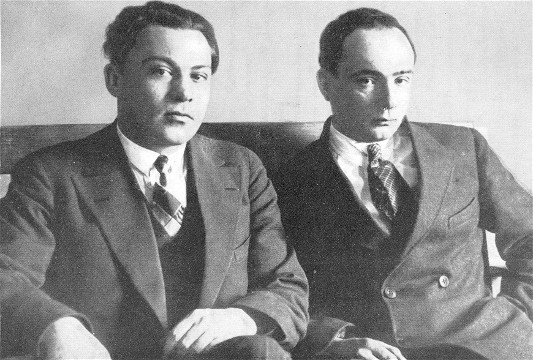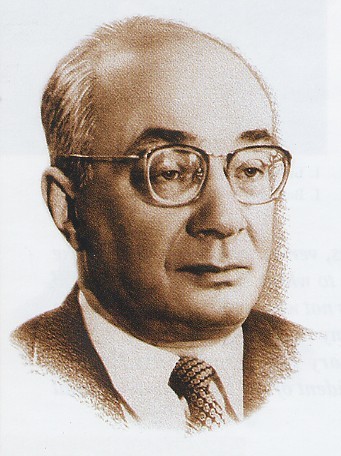Bazhan, Mykola
Bazhan, Mykola [Bažan], b 9 October 1904 in Kamianets-Podilskyi, d 23 November 1983 in Kyiv. (Photo: Mykola Bazhan.) Poet, writer, translator, and Soviet Ukrainian political and cultural figure; full member of the Academy of Sciences of the Ukrainian SSR from 1951. One of the most prominent representatives of the literary renaissance of the 1920s, he wrote screenplays, edited the journal Kino, and was associated with the literary groups Vaplite and Nova Generatsiia and the journal Literaturnyi iarmarok. Bazhan's poems were first published in 1923, but he gained recognition for the collections 17-i patrul' (The 17th Patrol, 1926). With Riz'blena tin' (The Sculptured Shadow, 1927), and especially Budivli (Buildings, 1929), Bazhan abandoned futurism and constructivism and emerged as a romantic expressionist, whose poems were characterized by dynamism, unusual imagery, monumentalism, and frequent references to the Ukrainian past.
In the poem ‘Budivli’ Bazhan treats historical themes, seeking a link between the modern era, the Middle Ages, and the Ukrainian baroque of the Cossack state. ‘Budivli’ and the poems ‘Rozmova serdets' ’(Heart-to-Heart Talk), in which he presented an unusually harsh assessment of Russia, ‘Hofmanova nich’ (Hoffman's Night, 1929), ‘Sliptsi’ (The Blind Beggars, 1933), ‘Trylohiia prystrasty’ (Trilogy of Passion, 1933), and others display an original poetic style: a bold statement of theme, a rich vocabulary replete with archaisms, syntactic complexity, an abundance of metaphor, and inventive rhyme. These poems, as well as the collections Doroha (The Road, 1930) and Poeziï (Poems, 1930), aroused harsh criticism of Bazhan: he was accused of ‘detachment from Soviet reality’, ‘idealism’, and nationalism.
During the terror of 1934–7 Bazhan wrote the trilogy Bezsmertia (Immortality, 1935–7), which was dedicated to S. Kirov, and entered the company of poets enjoying official recognition. His later works, written in the spirit of Stalinist patriotism, all belong to the corpus of official Soviet poetry. These include the collections Bat’ky i syny (Fathers and Sons, 1938), Iamby (Iambs, 1940), Klych vozhdia (The Call of the Leader, 1942), and V dni viiny (In the Days of War, 1945); the collections awarded the Stalin Prize — Kliatva (Oath, 1941), Danylo Halyts’kyi (Danylo of Halych, 1942), Stalinhrads’kyi zoshyt (Stalingrad Notebook, 1943), and Anhliis’ki vrazhennia (English Impressions, 1948); and the collections Virshi i poemy (Poetry and Long Poems, 1949), Bilia Spas’koï vezhi (Near the Savior's Tower, 1952), Ioho im’ia (His Name, 1952), Honets (The Chaser, 1954), Iednist’ (Unity, 1954), Tvory (Works, 1946–7), and Vybrane (Selected Works, 1951, from which poems of the early period were omitted). After Joseph Stalin's death Bazhan did not take part in the cultural renaissance launched by the shistdesiatnyky (poets of the sixties); his later collections and poems, Iasa (1960), Italiis’ki zustrichi (Meetings in Italy, 1961), Polit kriz' buriu (Flight through the Storm, 1964, for which he received the Shevchenko Prize [see Prizes and awards]), Umans’ki spohady (Memories of Uman, 1972), Nichni rozdumy staroho maistra (Nocturnal Reflections of an Old Master, 1976), and others, were also written in the spirit of Party ideology. Bazhan's translation of S. Rustaveli's poem Vytiaz' u tyhrovii shkuri (The Knight in the Tiger Skin, 1927) was published to great critical acclaim, and he has produced many masterful translations from Georgian, Russian, and Polish, as well as of the poetry of Rainer Maria Rilke. Bazhan is also the author of literary studies, reviews, and memoirs.
With the outbreak of war in 1941 Bazhan emerged as a leading political figure. He was editor of the newspaper Za Radians’ku Ukraïnu!, deputy chairman of the Council of Ministers of the Ukrainian SSR (1943–8), a long-term member of the Central Committee of the Communist Party of Ukraine and deputy of the Supreme Soviet of the Ukrainian SSR and of the USSR, and head of the Writers' Union of Ukraine (1953–9). From 1958 he headed the editorial board of the Ukrainian Soviet Encyclopedia publishing house and served as editor-in-chief of many of its publications.
BIBLIOGRAPHY
Lavrinenko, Yu., ed. Rozstriliane vidrodzhennia (Paris 1959)
Kostenko, N. Poetyka Mykoly Bazhana (1923–1940 rr.) (Kyiv 1971)
Adelheim, Ye. Mykola Bazhan (Kyiv 1974)
Ilnytzkyj, O. ‘Mykola Bažan: His Poetry and His Critics,’ Recenzija, 5, no. 2 (Cambridge, Mass 1975)
Kostenko, N. Poetyka Mykoly Bazhana 1941–1977 (Kyiv 1978)
Kostenko N. Mykola Bazhan. Zhyttia. Tvorchist’. Osoblyvosti virshostylistyky (Kyiv 2004)
Ivan Koshelivets
[This article originally appeared in the Encyclopedia of Ukraine, vol. 1 (1984).]
.jpg)


.jpg)
.jpg)